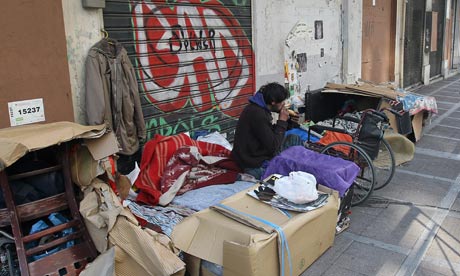Jon Henley goes to meet Greeks who have responded to austerity with innovation and resourcefulness as well as anger
Homelessness and boarded up businesses in Athens: Greeks fear several more years of swingeing austerity measures will change its society beyond recognition. Photograph: Orestis Panagiotou/EPA
Last week's news that Greece had won enough support from its private-sector creditors to finally secure the latest crucial €130bn (£109bn) bailout package was greeted with relief in Europe's capitals and undisguised joy in Greek government circles, where the deal was hailed as a "triumph".
It certainly gives Athens a breather. But for ordinary Greeks the price will be at least five more years of swingeing austerity measures that will change the country beyond recognition. EU officials have admitted that after seeing their wages cut by a third since 2009, Greeks will suffer a further 15% reduction in the next three years, and probably more after that.
The economy is forecast to shrink by up to 5% this year, after a 7% contraction last year. Stuck in recession for five straight years, Greece has seen its GDP shrink by a crushing 17%. That, is the level to which unemployment is expected to fall in two years' from 21%, at present.
Far from rescuing Greece, the austerity measures dictated by the IMF, European Union and European Central Bank, many here believe, will turn the eurozone member into a marginalised, third-world economy for decades to come. Not, of course, that Greece – in particular its swollen, corrupt and often hopelessly inept and wasteful public sector – didn't need reform. But at what cost?
Behind the numbers lies the reality that an estimated one-third of the Greek population has now fallen below the poverty line. Even for conservative analysts, the heavy and repeated cuts in salaries and pensions, spiralling tax hikes and never-ending public spending cutbacks are pushing Greece to the brink of economic, if not social, collapse.
Even the minimum wage is being slashed by 22%. The queues for the soup kitchens are lengthening; each day, the Greek Orthodox church is handing out emergency food rations to a quarter of a million people. An estimated 20,000 Greeks find themselves suddenly homeless, more than half of them in Athens.
Anger, particularly against the country's political class, is mounting, perhaps to dangerous levels. Commentators predict not just an explosion but an eruption, extraordinary scenes, even the breakdown of civil society. Elections scheduled for next month could prove a momentous test of strained resolve.
That said, alongside the fury there is solidarity. Self-help groups are emerging, citizen activists joining forces and several grassroots initiatives taking shape. Academics are offering free tuition; community web radio stations provide a forum for advice and support; volunteer soup kitchens deliver food to places the town hall can't reach. In municipalities around the country, farmers have started selling potatoes and other staple foods – including Easter lamb – to consumers directly, at ultra-low cost.
Last October I travelled to Portugal, Spain, southern Italy and northern Greece in search of real people's stories behind the headlines for a series called Europe on the breadline. This week I'm returning to Greece – to Athens and then up to Thessaloniki – on a similar quest, looking not only at how people's lives are being affected by the ongoing crisis, but also at the innovative and resourceful ways in which they have started to help each other.
Greece on the breadline: amid the fury, solidarity | Jon Henley | World news | guardian.co.uk
![The [Greek] European Tragedy](https://blogger.googleusercontent.com/img/b/R29vZ2xl/AVvXsEiWKI5s90SFm1wWTk6bs4p7CgslaC2SnYPsrZhb-B-smOufNNCSxCvpBLI9hOB-LsXZjir_PNmEiMk2-E62F3xkg96IoC6QFAaZAnPRTVH340IN9WBRmWJqPkjWlgyRj3zpALp7h6hvA58/s920/GkBack_new.jpg)
